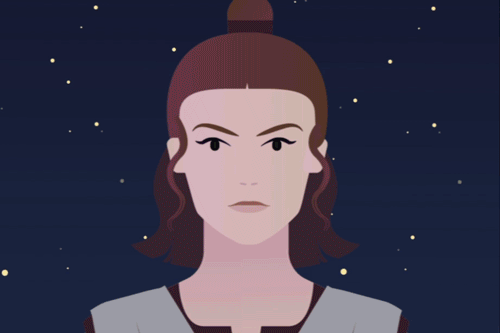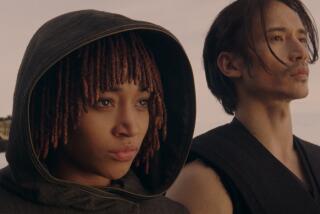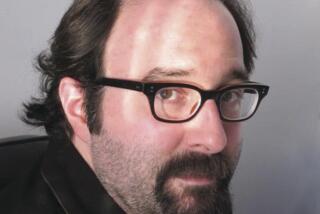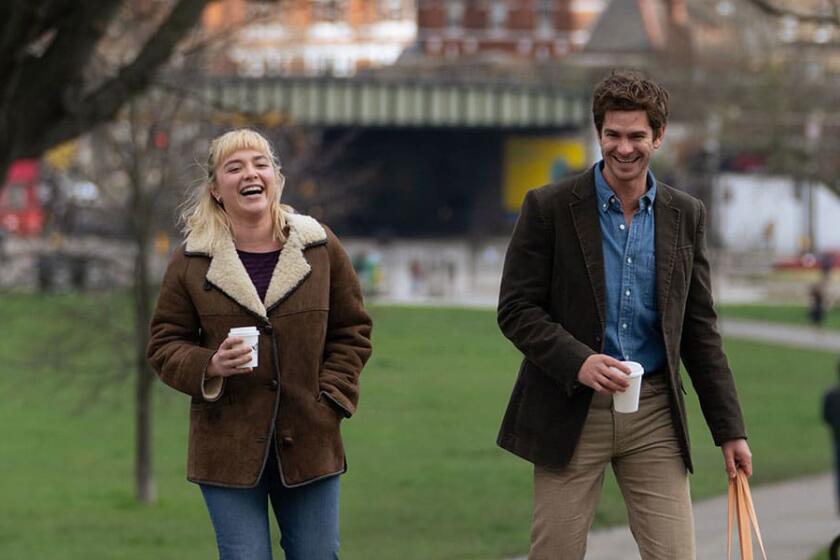Review: ‘Star Wars: The Rise of Skywalker’ is here to remind you just how good ‘The Last Jedi’ was
(Editor’s note: While every attempt has been made to avoid spoilers, this article does commit the unpardonable sin of discussing the plot of the movie being reviewed.)
“The dead speak!” Those three words, crawling up the screen in familiar yellow letters, are the first thing we see in “The Rise of Skywalker,” the frenzied big-bang finish of the latest and likely not last “Star Wars” trilogy. There are ominous signs that Emperor Palpatine, the vile Sith lord vanquished at the end of 1983’s “Return of the Jedi,” may be staging a comeback from beyond the grave. But if the dead can speak, they can also give us cause for tentative optimism and maybe, yes, a new hope: With any luck, perhaps the deep, transporting pleasure of vintage “Star Wars” might somehow be resurrected.
It’s a promise that director J.J. Abrams, who wrote the “Skywalker” script with Chris Terrio (“Argo”), desperately tries to fulfill with every weapon in his crowd-pleasing arsenal. I’ll be as vague as possible, but let’s just say that death here is never quite a permanent condition. Beloved characters laid to rest in earlier installments return as phantom projections. In the movie’s most poignant trick, the late Carrie Fisher gives her final performance as Leia Organa — one of the foundational figures, along with Luke Skywalker and Han Solo, of a saga that launched to paradigm-shattering popularity 42 years ago.
Abrams originally filmed Fisher’s scenes for 2015’s “The Force Awakens,” which established this trilogy’s central conflict between the evil First Order and the scrappy, heroic Resistance. That movie also introduced three appealing leads — Rey (Daisy Ridley), a desert scavenger with Jedi potential; Finn (John Boyega), an ex-Stormtrooper who joined the Resistance; and Poe Dameron (Oscar Isaac), a dashing Resistance pilot — and threw them into a familiar rebel narrative that consciously if not always imaginatively evoked the 1977 “Star Wars.”
“The Force Awakens” made a nice warm-up for Rian Johnson’s “The Last Jedi” (2017), which distinguished itself as the most thrilling and audacious new “Star Wars” picture since “The Empire Strikes Back,” if also, tellingly, the most divisive. What some of us regarded as clear storytelling virtues — a tough-minded view of heroism; a fresh, irreverent approach to an overworked fantasy mythology; probably the greatest performance of Mark Hamill’s career — were rejected as heresy by a noisy faction of the “Star Wars” faithful.
I suspect that more than a few fans who were incensed by “The Last Jedi” and its refusal to pander to their every expectation will be grateful to see Abrams re-ensconced in the director’s chair. Even if you simply watch the movie and ignore some of the controversy-stirring pre-release chatter, “The Rise of Skywalker” nakedly offers itself up in the spirit of a “Last Jedi” corrective, a return to storytelling basics, a nearly 2½-hour compendium of everything that made you fall in love with “Star Wars” in the first place.
The more accurate way to describe it, I think, is as an epic failure of nerve. This “Rise” feels more like a retreat, a return to a zone of emotional and thematic safety from a filmmaker with a gift for packaging nostalgia as subversion. Still, let’s acknowledge Abrams for the proficient craftsman and genre-savvy showman he is. Like some of his other major pop-cultural contributions (two enjoyable “Star Trek” movies and the twisty TV series “Lost” among them), “The Rise of Skywalker” is a swift and vigorous entertainment, with a sense of forward momentum that keeps you watching despite several dubious plot turns and cheap narrative fakeouts.
The unpretentious zippiness of Abrams’ direction infuses this chapter with what my screening companion described as “that ‘Star Wars’ flavor”: a breezy mix of jaunty comedy and bloodless action, high-spirited banter and high-flying peril. There are momentous aerial chases and lightsaber battles, the best of which is staged against beautifully cascading walls of water. There are lovely new landscapes and widescreen vistas (the cinematography is by Dan Mindel, the production design by Rick Carter and Kevin Jenkins).
The soundtrack is the usual diverting mix of fighter-pilot jargon, beep-beep droid chatter, Darth Vader exhalations and John Williams orchestrations. There are hastily introduced new Resistance allies — one played by Naomi Ackie, another by Abrams’ “Felicity” star, Keri Russell — and obligatory appearances by old ones like Maz Kanata (Lupita Nyong’o, sort of). Best of all, there is Adam Driver, as Kylo Ren, once more the darkly brooding yin to Rey’s righteous yang.
In a prologue as shadowy and sinister as a horror movie, Kylo Ren tracks down the renascent Palpatine (Ian McDiarmid), who orders him to embrace his villainous destiny by killing Rey once and for all. Easier said than done, and not just because Rey has become a Jedi superstar under the tutelage of Gen. Leia. I would gladly watch a whole movie devoted solely to Rey’s workout regimen, which involves a lot of meditative rock levitating and, presumably, some heavy-duty cardio using BB-8 as a medicine ball. Alas, the plot must kick in, and soon Rey flies off with Finn and Poe in the Millennium Falcon (plus Chewbacca, C-3PO and R2-D2) on a convoluted quest to retrieve a long-lost Sith tchotchke that will lead them to the Emperor.
Their journey is peppered with familiar faces (Billy Dee Williams!) and dazzling set pieces, including an interlude with a tribe of desert nomads whose brilliantly hued costumes are nearly as arresting as their mollusk-like faces. Along the way, the leads engage in some tiresome bickering — for all their individual charisma, Rey, Finn and Poe never develop any real, compelling interplay — which makes you all the more grateful when Kylo Ren arrives to shake things up. He and Rey duly wow us with the first of many showdowns; their quieter exchanges, in which each tries to persuade the other to defect, are even more impressive. Ridley and Driver work overtime to keep the human factor at the fore of their conflict, even when their back-and-forth starts to feel like a long, violent game of intergalactic tennis.
Kathleen Kennedy faces perhaps her biggest challenge since George Lucas chose her to shepherd ‘Star Wars’: figuring out what’s next for the franchise.
Rey sees the latent potential for redemption in Kylo Ren; he sees within her the early stirrings of the Dark Side of the Force. His parents, Leia and Han, are Rebel Alliance royalty; hers were nobodies who abandoned her in the desert. The “Star Wars” universe has of course long been obsessed with Oedipal struggles and other parental mysteries, not always to its benefit: One of the reasons “The Last Jedi” felt so mature by comparison was its suggestion that we might, in fact, be more than the sum of our daddy issues.
“The Rise of Skywalker” flirts coyly with this possibility, even as it pretty much lays its cards on the table by reinstating Palpatine as the ultimate big bad daddy, a figure of smirking paternal evil who has now figured prominently in all three “Star Wars” trilogies. As much as one never tires of listening to McDiarmid’s insinuating cackle or marveling at Palpatine’s ability to singlehandedly power the Rockefeller Center Christmas tree, his villainy ultimately offers a too-tidy moral and narrative escape hatch. The battles may be unpredictable, but the endgame is never really in doubt.
Look, I get it. Blockbuster moviemaking is invariably a tug-of-war between art and commerce, radical reinvention and old-school nostalgia. Rabid fans, snooty detractors and in-between agnostics like myself would be wise not to harbor any inflexible expectations about what these pictures will or should be. The problem with “The Rise of Skywalker” isn’t any single omission or misstep. It isn’t the succession of cheap “gotcha!” twists that briefly threaten to alter how we look at these characters, only to abruptly pull us back to rose-tinted reality.
Speaking of rose: It isn’t the strategic sidelining of Rose Tico (Kelly Marie Tran), an engaging character from “The Last Jedi” whose minimal screen time here will surely delight some of her more racist detractors. It isn’t the blink-and-you-miss-it shot of two women kissing — a craven sop to the many fans who have wondered if Finn and Poe’s intense chemistry might turn out to be more than strictly bromantic.
The problem is what all these choices tell us about the conflicting sensibilities that shaped this movie and may shape the next “Star Wars” adventures to appear on Hollywood’s endless event-movie horizon. If “The Rise of Skywalker” serves any purpose, it’s as a snapshot of what Disney, a First Order unto itself in the quest for global entertainment domination, thinks of the audience’s intelligence. It isn’t a flattering picture.
The central issue underlying the identity of this series isn’t parentage, but authorship.
George Lucas may have a lot to answer for, including his mostly dreadful 1999-2005 prequel cycle, but it’s hard not to admire his stubborn adherence to his own bizarre vision, rather than to some fan-tested, committee-approved notion of what a “Star Wars” movie should be. More than anything — more even than the billions in box office dollars that surely await it — this series needs artists willing to flood its mythology with new life, rather than turning it into another endless replay of “The Skywalking Dead.”
Two clever and wickedly funny looks at class warfare lead a standout year for deeply personal movies.
‘Star Wars: The Rise of Skywalker’
Rating: PG-13, for sci-fi violence and action
Running time: 2 hours, 22 minutes
Playing: Opens Dec. 20 in general release
More to Read
Only good movies
Get the Indie Focus newsletter, Mark Olsen's weekly guide to the world of cinema.
You may occasionally receive promotional content from the Los Angeles Times.













